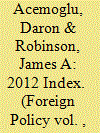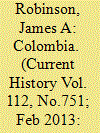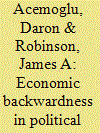|
|
|
Sort Order |
|
|
|
Items / Page
|
|
|
|
|
|
|
| Srl | Item |
| 1 |
ID:
115858


|
|
|
| 2 |
ID:
118273


|
|
|
|
|
| Publication |
2013.
|
| Summary/Abstract |
[D]espite all of the gains under the past two presidents, neither administration has broken with the fundamental system of governance that created the country's problems.
|
|
|
|
|
|
|
|
|
|
|
|
|
|
|
|
| 3 |
ID:
069796


|
|
|
| 4 |
ID:
180814


|
|
|
|
|
| Summary/Abstract |
Existing theories of democratic reversals emphasize that elites mount actions like coups when democracy is particularly threatening to their interests. However, existing theory has been largely silent on the role of elite social networks, which interact with economic incentives and may facilitate antidemocratic collective action. We develop a model where coups generate rents for elites and show that the effort an elite puts into a coup is increasing in their network centrality. We empirically explore the model using an original dataset of Haitian elite networks that we linked to firm-level data. We show that central families were more likely to be accused of participating in the 1991 coup against the democratic Aristide government. We then find that the retail prices of staple goods that are imported by such elites differentially increase during subsequent periods of nondemocracy. Our results suggest that elite social structure is an important factor in democratic reversals.
|
|
|
|
|
|
|
|
|
|
|
|
|
|
|
|
| 5 |
ID:
193645


|
|
|
|
|
| Summary/Abstract |
We develop a theory of the accumulation of state capacity as the outcome of a political competition between elites and (civil) society. State capacity is accumulated by elites, and it is productive as well as useful in controlling society. However, society can fight back and accumulate its own capacity, facilitating collective action. The theory leads to three distinct equilibria depending on initial conditions. One type, a weak state, emerges when society is strong relative to the elite. Another, a despotic state, originates where the elite is initially relatively powerful. A third type, an inclusive state, emerges when the elite and society are more evenly matched. The theory has several important implications; first, variation in state capacity does not require large structural differences; second, inclusive states have the highest levels of state capacity in the long run; third, the effects of shocks or external threats like wars are conditional on the balance of power between elites and society.
|
|
|
|
|
|
|
|
|
|
|
|
|
|
|
|
| 6 |
ID:
105911


|
|
|
|
|
| Publication |
2011.
|
| Summary/Abstract |
The conventional wisdom is that for a democracy to be consolidated, all groups must have a chance to attain power. If they do not, then they will subvert democracy and choose to fight for power. In this article, the authors show that this wisdom is seriously incomplete because it considers absolute, not relative payoffs. Although the probability of winning an election increases with the size of a group, so does the probability of winning an armed conflict. Thus, in a situation in which all groups have a high chance of winning an election, they may also have a high chance of winning a fight. Indeed, in a natural model, the authors show that democracy may never be consolidated in such a situation. Rather, democracy may only be stable when one group is dominant. The authors explore this key aspect of the theory using data from La Violencia, a political conflict in Colombia during the years 1946-1950 between the Liberal and Conservative parties. Consistent with their results, and contrary to conventional wisdom, the authors show that fighting between the parties was more intense in municipalities where the support of the parties was more evenly balanced.
|
|
|
|
|
|
|
|
|
|
|
|
|
|
|
|
| 7 |
ID:
125071


|
|
|
|
|
| Publication |
London, Profile Books Ltd., 2013.
|
| Description |
xi, 529p.Pbk
|
| Standard Number |
9781846684302
|
|
|
|
|
|
|
|
|
|
|
|
Copies: C:1/I:0,R:0,Q:0
Circulation
| Accession# | Call# | Current Location | Status | Policy | Location |
| 057518 | 330/ACE 057518 | Main | On Shelf | General | |
|
|
|
|
|
|
|
|
|